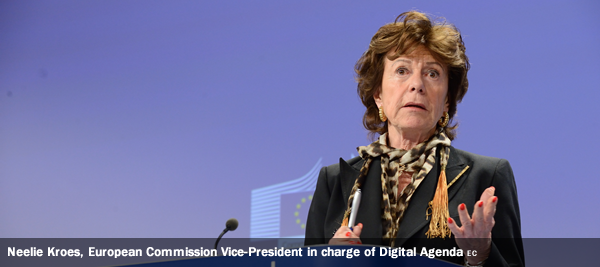This opinion has radically changed. Everyone now acknowledges that developments in the area of ICT are going at incredible speed, and hold the promise of tremendous innovation and growth opportunities and can effectively address societal challenges. If we really want this promise to unfold, we do not only need to put the right enabling conditions in place. We also need a different (digital) mindset and rethink certain existing and dominant concepts which keep us rooted in the past.
Over the past five years of this mandate I have been so privileged to meet many fascinating and inspiring people from all ages, backgrounds and parts of the world. They shared with me their thoughts, often groundbreaking ideas and even bold visions what the impact of ICT could be and what needed to be done to make this happen, or sometimes also to prevent this from happening.
At the end of this mandate I would like to share some of these ideas and visions with you. During the summer I approached a relatively small number of people, varying from architects to scientists, CEO’s and politicians to give their views on how to deal with the changes which are sparked by ICT in Europe. How to make the best use of them, looking at developments like Big Data, Internet of Things or Cloud Computing. Or to put it boldly: how to boost a Digital Europe.
For the next coming weeks they will share their ideas and visions with you. I hope it will spark a fruitful debate and that it will only be the start of a series where more and more people will share and participate in a discussion how to boost a Digital Europe. Today, because of the internet, we can all share, participate, connect with our ideas and together contribute to a different future. Let’s make use of it! Everyone needs to be involved. Digital technologies are like water that can make economy and society flourish and we almost can’t imagine a life without it anymore. At the same time, if we don’t deal timely and effectively with key issues such as data-privacy, cyber bullying or cybercrime and even terrorism, trust in the opportunities of the internet might gradually, and perhaps even irreversibly, erode.
We don’t need to dream anymore about a type of a man on the moon vision. Reality has landed on our doorstep. Looking at our digital scoreboard, Europe is well placed to benefit from the potential of ICT. The huge size of its GDP, which has made it the largest economic bloc in the world; its relatively high levels of per capita income and productivity, the major and increasing contributions from European firms to producing for the global value chain of manufactured goods, and the above-average level of innovation infrastructure in which business, government, and research interact, are putting Europe in a strong position to book results, for example, by improving Europe’s ability to bring its innovations to market and society.
To fully exploit this potential, however, the rapid completion of the Digital Single Market Still is pivotal. It is the jewel in the crown of a united Europe and can bring progress and prosperity to its citizens. A lot still needs to be done, but is within reach if we put our minds, investments and efforts to it. For instance, around a 100 million Europeans have never visited internet. This is a stunning fact, but at the same time a huge untapped potential. We have a unique challenge ahead of us.
Let us make sure time is not running out. Other countries and regions are racing ahead, and in the digital world, many activities move to where they will flourish, in a pace which will make it difficult for us to catch up or reverse the dynamics. Let’s put our minds to it. I am challenging you to make the difference.
